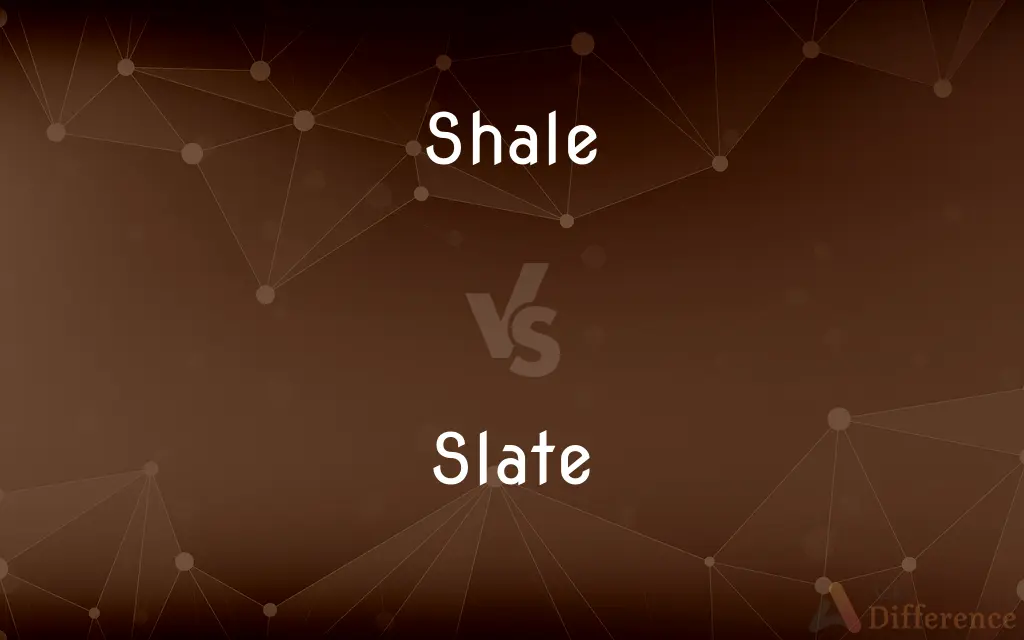Shale vs. Slate — What's the Difference?
By Tayyaba Rehman — Updated on November 6, 2023
Shale is a fine-grained sedimentary rock that forms from the compaction of silt and clay-sized mineral particles. Slate is a fine-grained metamorphic rock that is formed from the metamorphism of shale.

Difference Between Shale and Slate
Table of Contents
ADVERTISEMENT
Key Differences
Shale is characterized by its fine layers or stratification, often seen in various earthy colors. It forms from the consolidation of clay and silt in low-energy environments like deep marine settings. Slate, on the other hand, is shale that has been subjected to high pressure and temperature, leading to a denser and harder rock with a pronounced foliation.
Both shale and slate can exhibit similar color variations, from greys and blacks to greens, reds, and browns. However, slate has a distinct, smooth to touch texture, and it breaks along planar surfaces, whereas shale is more fissile, breaking into thinner sheets due to its sedimentary layering.
Slate is often used as a durable roofing material due to its strength and cleavage properties. Shale, being softer and less durable than slate, is generally not used in construction but is important in the energy sector for its organic material content, which can be a source for petroleum and natural gas.
The transformation from shale to slate involves a process called metamorphism, which realigns the minerals in shale to form slate's characteristic parallel layers. Unlike the relatively less dense shale, slate's higher density and strength make it a preferred material for heavy-duty construction and decorative purposes.
In terms of origin, shale is deposited in a variety of sedimentary basins while slate often forms in regions with past or present tectonic activity, as the necessary pressure and temperature conditions are typically found near plate boundaries or mountain ranges.
ADVERTISEMENT
Comparison Chart
Type of Rock
Sedimentary
Metamorphic
Formation
From compaction of silt and clay
From metamorphism of shale
Texture
Fissile, breaks into thin layers
Hard and dense, breaks along planar surfaces
Use
Source for oil and gas
Roofing and flooring material
Durability
Less durable
More durable
Compare with Definitions
Shale
Soft and brittle, easily broken into pieces.
The shale crumbled in my hands.
Slate
Used for heavy-duty construction materials.
We chose slate for our kitchen countertops.
Shale
Typically formed in quiet water, like deep seas.
Ocean basins are common sites of shale formation.
Slate
Slate is a fine-grained, foliated, homogeneous metamorphic rock derived from an original shale-type sedimentary rock composed of clay or volcanic ash through low-grade regional metamorphism. It is the finest grained foliated metamorphic rock.
Shale
A rock that is a source of oil and gas.
Shale gas has become an important energy resource.
Slate
A fine-grained metamorphic rock that splits into thin, smooth-surfaced layers.
Shale
A sedimentary rock made of compacted mud.
They found fossils embedded in the shale.
Slate
A piece of this rock cut for use as roofing or surfacing material or as a writing surface.
Shale
Fine-grained, often with layers visible.
The cliffs were composed of layers of shale.
Slate
A writing tablet made of a similar material.
Shale
Shale is a fine-grained, clastic sedimentary rock, formed from mud that is a mix of flakes of clay minerals and tiny fragments (silt-sized particles) of other minerals, especially quartz and calcite. Shale is characterized by its tendency to split into thin layers (laminae) less than one centimeter in thickness.
Slate
A record of past performance or activity
Start over with a clean slate.
Shale
Soft finely stratified sedimentary rock that formed from consolidated mud or clay and can be split easily into fragile plates.
Slate
A list of the candidates of a political party running for various offices.
Shale
A fissile rock composed of layers of claylike, fine-grained sediments.
Slate
A dark or bluish gray to dark bluish or dark purplish gray.
Shale
A shell or husk; a cod or pod.
Slate
Made of a fine-grained metamorphic rock
A slate roof.
Shale
(geology) A fine-grained sedimentary rock of a thin, laminated, and often friable, structure.
Slate
Of the color slate.
Shale
To take off the shell or coat of.
Slate
To cover (a roof, for example) with slate.
Shale
A shell or husk; a cod or pod.
Slate
To put on a list of candidates.
Shale
A fine-grained sedimentary rock of a thin, laminated, and often friable, structure.
Slate
To schedule or designate
Our professor has slated the art history lecture for Thursday afternoon.
Was slated to direct the studio's next film.
Shale
To take off the shell or coat of; to shell.
Life, in its upper grades, was bursting its shell, or was shaling off its husk.
Slate
A fine-grained homogeneous sedimentary rock composed of clay or volcanic ash which has been metamorphosed so that it cleaves easily into thin layers.
Shale
A sedimentary rock formed by the deposition of successive layers of clay
Slate
(uncountable) The bluish-grey colour of most slate.
Slate
(countable) A chalkboard, sheet of slate for writing on with chalk or with a thin rod of slate (a slate pencil) formerly commonly used by both students and teachers in schools.
Slate
(countable) A roofing-tile made of slate.
Slate
(countable) A record of money owed.
Put it on my slate – I’ll pay you next week.
Slate
A list of affiliated candidates for an election.
Slate
An artificial material resembling slate and used for the same purposes.
Slate
A thin plate of any material; a flake.
Slate
A tablet computer.
Slate
Having the bluish-grey/gray colour of slate.
Slate
(transitive) To cover with slate.
The old church ledgers show that the roof was slated in 1775.
Slate
To criticise harshly.
The play was slated by the critics.
Slate
To schedule.
The election was slated for November 2nd.
Slate
To anticipate or strongly expect.
The next version of our software is slated to be the best release ever.
Slate
To set a dog upon (a person).
Slate
To nominate, appoint, or designate.
Slate
An argillaceous rock which readily splits into thin plates; argillite; argillaceous schist.
Slate
Any rock or stone having a slaty structure.
Slate
A prepared piece of such stone.
Slate
An artificial material, resembling slate, and used for the above purposes.
Slate
A thin plate of any material; a flake.
Slate
A list of candidates, prepared for nomination or for election; a list of candidates, or a programme of action, devised beforehand.
Slate
To cover with slate, or with a substance resembling slate; as, to slate a roof; to slate a globe.
Slate
To register (as on a slate and subject to revision), for an appointment.
Slate
To set a dog upon; to bait; to slat. See 2d Slat, 3.
Slate
(formerly) a writing tablet made of slate
Slate
Thin layers of rock used for roofing
Slate
A fine-grained metamorphic rock that can be split into thin layers
Slate
A list of candidates nominated by a political party to run for election to public offices
Slate
Designate or schedule;
He slated his talk for 9 AM
She was slated to be his successor
Slate
Enter on a list or slate for an election;
He was slated for borough president
Slate
Cover with slate;
Slate the roof
Slate
A dense metamorphic rock with fine grains.
The old schoolhouse had a slate roof.
Slate
Forms through the metamorphism of shale.
Geologists can trace slate back to its shale origins.
Slate
Known for its cleavage into flat slabs.
The slate split easily into thin, durable sheets.
Slate
Often used as a traditional roofing material.
Many historic buildings feature slate tiles.
Common Curiosities
What is shale used for?
Shale is often used as a source of oil and natural gas.
Is slate harder than shale?
Yes, slate is denser and harder than shale due to its metamorphic origins.
What is shale?
Shale is a fine-grained sedimentary rock primarily composed of clay and silt particles.
What is slate used for?
Slate is commonly used in construction, particularly for roofing and flooring materials.
How can you tell shale and slate apart?
Shale is typically softer and has a fissile nature, while slate is harder and breaks into flat slabs.
Can shale turn into slate?
Yes, through the process of metamorphism, shale can be transformed into slate.
What is slate?
Slate is a fine-grained metamorphic rock that forms from the alteration of shale under pressure and heat.
Are shale and slate the same color?
They can be similar in color, but their textures and structural integrity differ.
Can slate be recycled?
Yes, slate can be reused or recycled in construction.
Are there environmental concerns with mining slate and shale?
Yes, mining can have significant environmental impacts, including habitat destruction and pollution.
What are the economic implications of shale and slate?
Shale has major implications for the energy sector, while slate is important in construction.
Is shale a renewable resource?
No, shale is not considered renewable as it forms over geologic time scales.
How are shale and slate formed?
Shale forms from sediment deposition, while slate forms from shale under heat and pressure.
Can shale be used for construction?
Generally, it is not used for construction due to its softness.
Do shale and slate have the same mineral composition?
They have similar compositions, but slate's minerals are realigned due to metamorphism.
Share Your Discovery

Previous Comparison
Gypsum vs. Drywall
Next Comparison
Python vs. AnacondaAuthor Spotlight
Written by
Tayyaba RehmanTayyaba Rehman is a distinguished writer, currently serving as a primary contributor to askdifference.com. As a researcher in semantics and etymology, Tayyaba's passion for the complexity of languages and their distinctions has found a perfect home on the platform. Tayyaba delves into the intricacies of language, distinguishing between commonly confused words and phrases, thereby providing clarity for readers worldwide.
















































